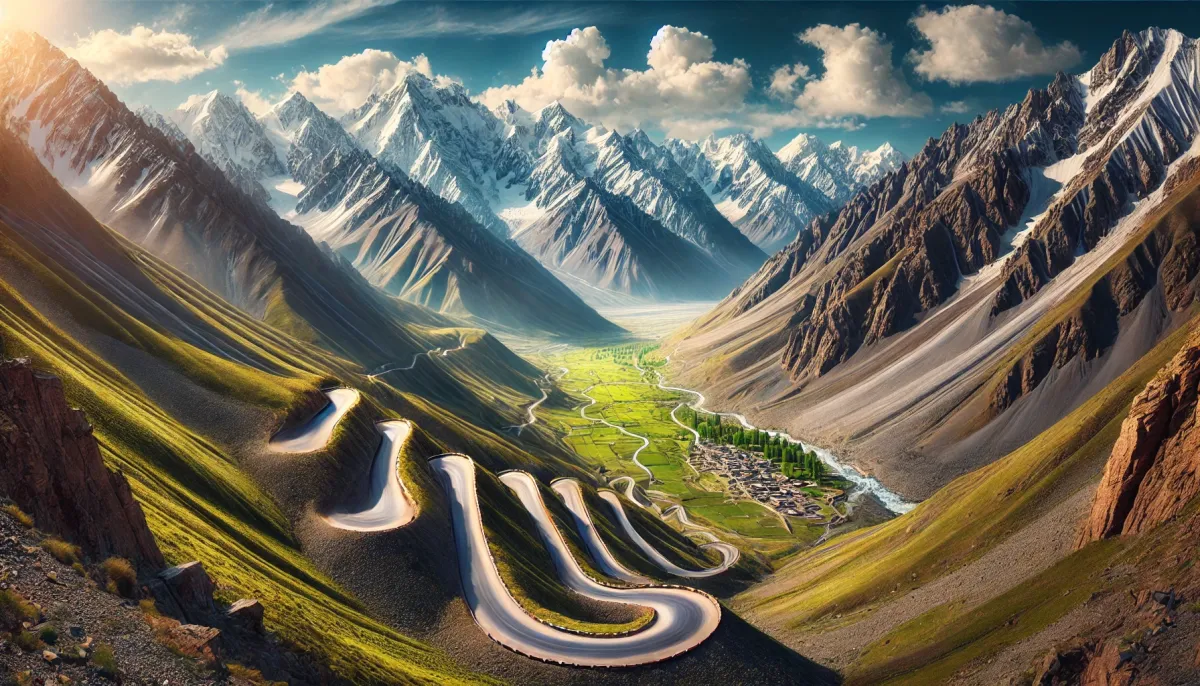Hey everyone, Mark here! As a seasoned backpacker with a love for exploring Asia's hidden gems, I recently embarked on an unforgettable adventure to Wakja Township, nestled deep within the remote Pamir Plateau of China. This area, bordering Pakistan, Afghanistan, and Tajikistan, is home to the unique Tajik people, often called China's only Caucasian ethnic group. My 11-day stay in Tashkurgan Tajik Autonomous County had begun to lose its initial novelty, so I decided it was time to delve deeper into the heart of this breathtaking region. This blog post recounts my journey, offering a glimpse into the lives of the Tajik people and the stunning landscapes that surround them. Consider this your ultimate guide if you're planning a trip to this incredible part of the world!
The Unexpected Route to Wakja
I initially planned to take the legendary Panlong Ancient Road to Wakja, a breathtakingly scenic route known for its incredible hairpin turns carved into the mountainside. However, my driver, instead, opted for the less-dramatic, but equally challenging, County Road 613. While I missed the Panlong Ancient Road initially, it turned out to be a blessing in disguise, as I discovered later. The journey itself was stunning, showcasing the beauty of the Tashkurgan River, which in some sections, resembled a vast lake, and the mesmerizing Bandir Lake, its blue hue a striking contrast to the arid landscape. The transition from the barren beauty of the plateau to the surprisingly lush greenery of the Wakja valley was gradual, but stunning.
Wakja Township: A Hidden Oasis
After a scenic drive, I arrived in Wakja Township around 2:44 PM. My driver dropped me off at a bustling farmer's market, which served as the town's central hub. The first thing that struck me was the cool temperature; even in mid-July, Wakja felt surprisingly chilly, prompting me to quickly don my down jacket. The altitude here is approximately 3,281 meters (10,764 feet), around 200 meters higher than Tashkurgan.
Life in Wakja: Border Life and Daily Existence
Wakja's proximity to the borders of Pakistan, Afghanistan, and Tajikistan is palpable. Signs referencing "border" are ubiquitous. I even saw a cleaning lady wearing a jacket with "border guard" embroidered on the sleeve! The local police station is also designated as the "Wakja Border Police Station." This close proximity to the border significantly impacts the lives of the people in Wakja.
I also learned from some Han Chinese I met in Xinjiang that many families relocated to Xinjiang for reasons related to China's previous family planning policies. Interestingly, even in Wakja, I noticed a family planning service center, despite the three-child policy now in effect.
Wakja’s small local market surprised me with its abundance of goods. I was particularly struck by the availability of fresh produce, including tropical fruits like mangoes and dragon fruit. The prices seemed reasonable and comparable to those in mainland China.
Here's a sample of the prices I found (all prices are in Chinese Yuan):
| Item | Price (CNY) |
|---|---|
| Pulse Drink | 5 |
| Mangoes | 10/kg |
| Dragon Fruit | 5/pc |
| Small Apples | 18/kg |
| Peaches | 20-22/kg |
| Cabbage | (price not noted) |
| Potatoes | (price not noted) |
The availability of such a diverse range of produce, even in such a remote location, is a testament to China's improved logistics and infrastructure.
Wakja's People: Resilience and Patriotism
The Tajik people of Wakja are incredibly resilient and deeply patriotic, with a strong sense of community. Many families have at least one member working as a border guard, providing a stable income. I had conversations with locals, including children, who shared their perspectives on life in this remote area. The children I spoke with expressed a surprising fondness for Shenzhen, a city known for its economic dynamism and its sister-city relationship with Tashkurgan.
One particularly poignant story I heard was about Laqini Bayika, a Tajik border guard who tragically lost his life while saving a boy who fell off a cliff. He's considered a local hero.
I also witnessed the traditional Tajik lifestyle firsthand, from women in vibrant clothing working in the fields to children playing in courtyards surrounded by poplar tree walls.
Hiking to the Panlong Ancient Road
My next goal was to hike to the Panlong Ancient Road, a breathtaking mountain pass. The hike was challenging but rewarding. Along the way, I encountered breathtaking scenery – wild rapeseed flowers blooming amid the stark beauty of the landscape. The views from the Panlong Ancient Road were truly spectacular, offering a panoramic vista of the Wakja valley and the surrounding snow-capped mountains.
The Panlong Ancient Road itself is a marvel of engineering, with its countless hairpin turns winding up the mountainside. Despite the challenges, the sense of accomplishment after reaching the famous sign proclaiming, "Today you have traversed all the winding roads; from now on, life will be smooth sailing," was immense.
Practical Information & Safety Concerns
- Border Permits: Remember to obtain the necessary border permits before visiting this area. I was stopped by the police and reminded of the importance of registering with the local police station upon arrival in a border region. While the process felt somewhat strict, the officers were polite and professional.
- Transportation: Transportation options within Wakja and to Tashkurgan are limited. It’s best to arrange transportation in advance or be prepared for potentially long waits for rides.
- Altitude Sickness: Wakja's high altitude can trigger altitude sickness. Take it easy, stay hydrated, and be mindful of your physical limitations.
Final Thoughts
My journey to Wakja Township was an eye-opening experience. The breathtaking landscapes, the warm hospitality of the Tajik people, and the challenging yet rewarding journey itself combined to create a truly unforgettable adventure. While this remote region presents some challenges, the rewards – both in terms of stunning natural beauty and cultural immersion – are immense. I highly recommend this destination to any intrepid traveler seeking a unique and unforgettable experience in Asia.







